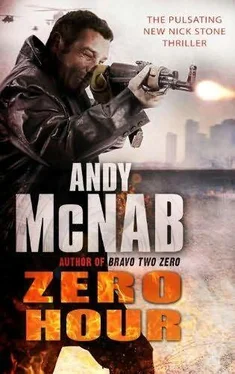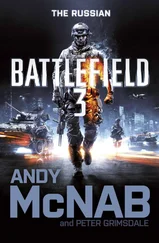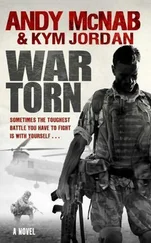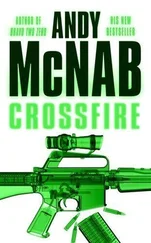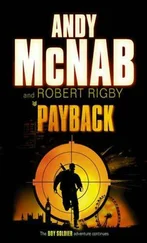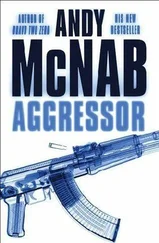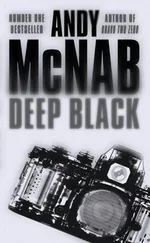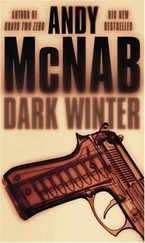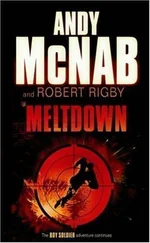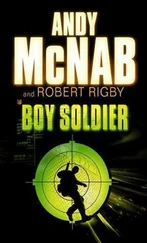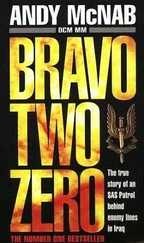Andy McNab - Zero hour
Здесь есть возможность читать онлайн «Andy McNab - Zero hour» весь текст электронной книги совершенно бесплатно (целиком полную версию без сокращений). В некоторых случаях можно слушать аудио, скачать через торрент в формате fb2 и присутствует краткое содержание. Жанр: Триллер, на английском языке. Описание произведения, (предисловие) а так же отзывы посетителей доступны на портале библиотеки ЛибКат.
- Название:Zero hour
- Автор:
- Жанр:
- Год:неизвестен
- ISBN:нет данных
- Рейтинг книги:4 / 5. Голосов: 1
-
Избранное:Добавить в избранное
- Отзывы:
-
Ваша оценка:
- 80
- 1
- 2
- 3
- 4
- 5
Zero hour: краткое содержание, описание и аннотация
Предлагаем к чтению аннотацию, описание, краткое содержание или предисловие (зависит от того, что написал сам автор книги «Zero hour»). Если вы не нашли необходимую информацию о книге — напишите в комментариях, мы постараемся отыскать её.
Zero hour — читать онлайн бесплатно полную книгу (весь текст) целиком
Ниже представлен текст книги, разбитый по страницам. Система сохранения места последней прочитанной страницы, позволяет с удобством читать онлайн бесплатно книгу «Zero hour», без необходимости каждый раз заново искать на чём Вы остановились. Поставьте закладку, и сможете в любой момент перейти на страницу, на которой закончили чтение.
Интервал:
Закладка:
While Anna slept, I'd thought about Lilian.
She'd bought herself a return ticket, but that might not be significant. She was bright enough to know she'd have problems at Danish Immigration if she couldn't show an intention to leave. I bet Slobo had told her that.
Anna had told me that citizens of the Republic of Moldova can't just rock up at the check-in desk and jump on the first plane to the EU. Pre-2007, they'd had to report in person to the Danish embassy in Bucharest, in neighbouring Romania, for a tourist visa. Post-2007, an EU Common Visa Application Centre had been set up in the Hungarian embassy in Chisinau to simplify travel to Greece, the Netherlands, Belgium and twelve other 'Schengen treaty' countries.
The Schengen visa was designed to make travelling between its fifteen European member states – which aren't the same as the EU countries – much easier and less bureaucratic, but they're still not issued on the spot. They take ten days to process.
Travelling on a Schengen visa means that the holder can travel to any or all member countries, avoiding the hassle and expense of obtaining a new one for each country. This might have been good for Lilian, but it could be a problem for us. She could have landed in Copenhagen, but then been moved on to Austria, Germany, Belgium, Finland, France, Greece, Iceland, Italy, Luxembourg, Norway, Portugal, Spain, Sweden, or the Netherlands.
There was something else Julian had got from the Hungarians: a scan of all three pages of Lilian's Schengen-visa application form. Besides all the usual personal details, she had had to state the main purpose of the journey (she'd put tourism); duration of stay (up to thirty days); whether her fingerprints had been collected previously for the purpose of applying for a Schengen visa (no, they hadn't); intended date of arrival in the Schengen area (3 March); intended date of departure from the Schengen area (10 March); and surname and first name of the inviting person(s) in the member state(s). If that wasn't applicable, then the name of hotel(s) or temporary accommodation(s) in the member state(s), and the address and email address of the inviting person(s)/hotel(s)/temporary accommodation(s). She'd put Hotel d'Angleterre, 34 Kongens Nytorv. Was the cost of travelling and living during the applicant's stay covered by the applicant himself/herself? Yes. Means of support? Credit card.
None of her responses meant very much. Plenty of people bluff in their visa applications and she'd had Slobo helping her on her way.
At the bottom of the form, she'd had to sign that she was aware of and consented to the collection of the data required by this application form, the taking of her photograph and, if applicable, of her fingerprints.
Julian had already checked. They hadn't taken her fingerprints, but she had supplied a photograph; he sent it to my BlackBerry. She looked more or less the same as she had outside the factory. Her hair was a bit longer, that was all. Or it had been. It might be short again by now.
So all we knew was that she had landed in Copenhagen. Julian had been able to confirm she hadn't taken an onward flight. But that also meant jack-shit. She could now be on a train or a car to anywhere in Europe. The only good thing about her being trafficked rather doing a runner was that someone, somewhere, knew where she was.
We didn't have a choice. We had to find the next link in the trafficking chain, then follow whatever we could wring out of him.
2
The moment I saw the Hotel d'Angleterre I knew we weren't going to be finding Lilian's name anywhere on the register. A big, imposing building overlooking an elegant square in the heart of the city, it was clearly a five-star establishment with fuck-off rooms that would cost at least two thousand kroner (three hundred dollars) a night. When she'd seen she needed a name for her visa application, she must have done a quick Google and chosen the most distinguished. Maybe Slobo had told her it carried a lot more weight than a B-and-B in the hippie quarter.
I parked up.
Anna had gone to book us into an airport hotel while I got a serious wad of kroner from an ATM, organized the car, bought a city guidebook and cajoled a shedload of coins from the shopkeeper. Once we'd checked in, I'd gone to the hotel business centre and bluetoothed Lilian's picture to a printer. Fuck the shower and shave: we'd buy new kit later.
We now had an A4 colour copy each, as well as a map of Christiania downloaded from the Internet and printed off.
The d'Angleterre was as grand inside as out. It wasn't the sort of place to have pictures of its clientele on the wall, but I knew from Anna's Googling that everyone from Winston Churchill to Tony Blair had stayed there when they were in town.
To the left was a cocktail bar. Reception was to the right. The uniformed guy behind the desk greeted us with an efficient but not over-friendly smile. 'Equality is entrenched in the Danish psyche,' Anna told me. 'Staff don't go out of their way to establish rapport with customers, in any sort of business.'
And there was me thinking they were just miserable.
I produced Lilian's picture and passed it over. 'Have you seen our sister? She would have checked in here ten days ago. We haven't heard from her and – well, we're getting a bit concerned, to be honest. She's travelling alone.'
He studied it hard. He was in his twenties himself. A guest as attractive as Lilian would have registered. I watched his eyes not his lips as he replied. He didn't recognize her. I could have asked if there was anyone else I could check with, but there didn't seem much point. If all other avenues ended in dead ends, we'd come back here and start all over again.
We went back to the car.
'I've been thinking about your treatment.'
'Lack of it, you mean.'
'Why not in Moscow? We would have more time together.'
'More time dribbling and shitting myself. What's the good of that? I don't want it. I certainly don't want you exposed to it.'
'Isn't that my choice?'
'Maybe. But the way I see it, I go on until it's too painful or just too much for us both. Then I take a couple of bottles of pills, we lie down and only you wake up.' I hit the key fob. 'What do you think?'
She opened her door and stared across the roof at me. 'Brilliant. And I get left to clean up the mess.'
3
Christiania was a short distance away. While I drove, Anna scanned the guidebook. In 1971, the abandoned eighty-five-acre military camp at Christianhavn, on the eastern edge of the city, had been taken over by squatters who proclaimed it the 'free town' of Christiania. The police tried to clear the area, but it was the height of the hippie era and people looking for an alternative lifestyle poured in from all over Denmark. The following year, bowing to public pressure, the government allowed the community to continue as a social experiment. About a thousand people had settled in, transforming the old barracks into schools and housing and starting their own collective businesses, workshops and recycling programmes.
'A thousand people on an eighty-five-acre site.' I glanced across at her. 'Where would a concerned sibling start looking?'
'She'll have turned up needing somewhere to stay. There's nowhere you can pay to stay in Christiania. I think Slobo promised to help her do the runner, told her this was the perfect place to hide, and finished off with the oldest trick in the trafficking book: saying he had a friend who would help her and even get her a job.'
'Whatever, she'd also have needed to eat and drink. Even if she's already been moved on, someone must have seen her.'
She ran her finger down the page. 'Car-free Christiania has a market, some craft shops, and several places where you can get coffee and something to eat. The main entrance is on Prinsessegade, two hundred metres north-east of its intersection with Badsmandsstraede. You can take a guided tour of Christiania. There's a Pusher Street information office next to the Oasen cafe.'
Читать дальшеИнтервал:
Закладка:
Похожие книги на «Zero hour»
Представляем Вашему вниманию похожие книги на «Zero hour» списком для выбора. Мы отобрали схожую по названию и смыслу литературу в надежде предоставить читателям больше вариантов отыскать новые, интересные, ещё непрочитанные произведения.
Обсуждение, отзывы о книге «Zero hour» и просто собственные мнения читателей. Оставьте ваши комментарии, напишите, что Вы думаете о произведении, его смысле или главных героях. Укажите что конкретно понравилось, а что нет, и почему Вы так считаете.
